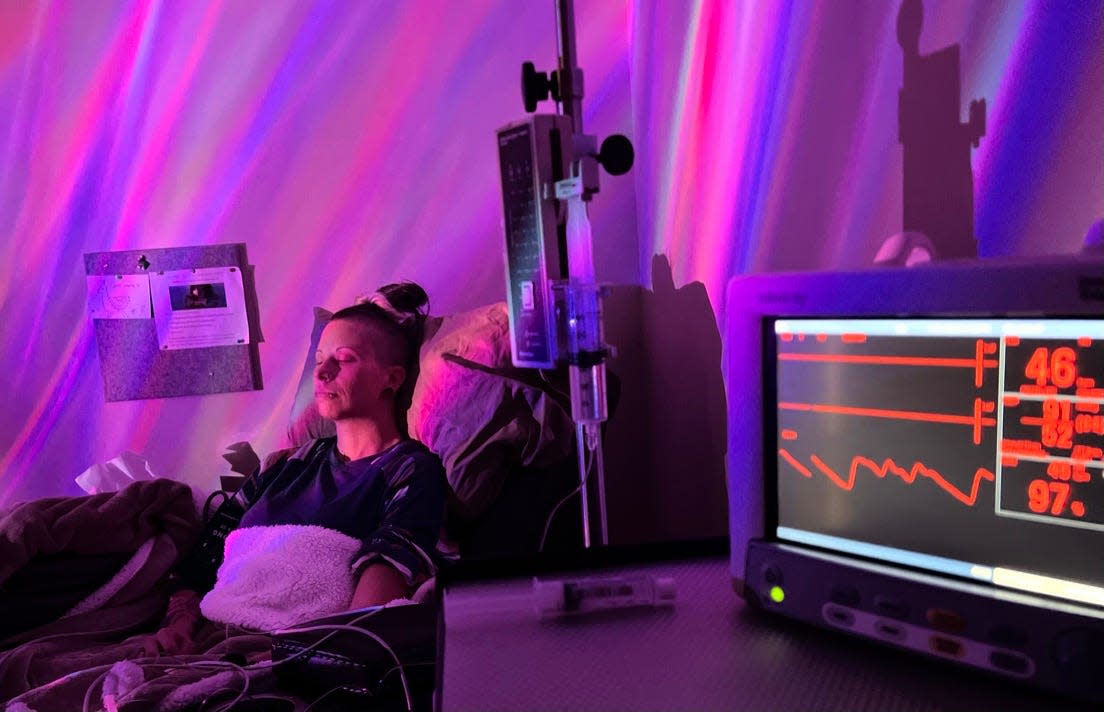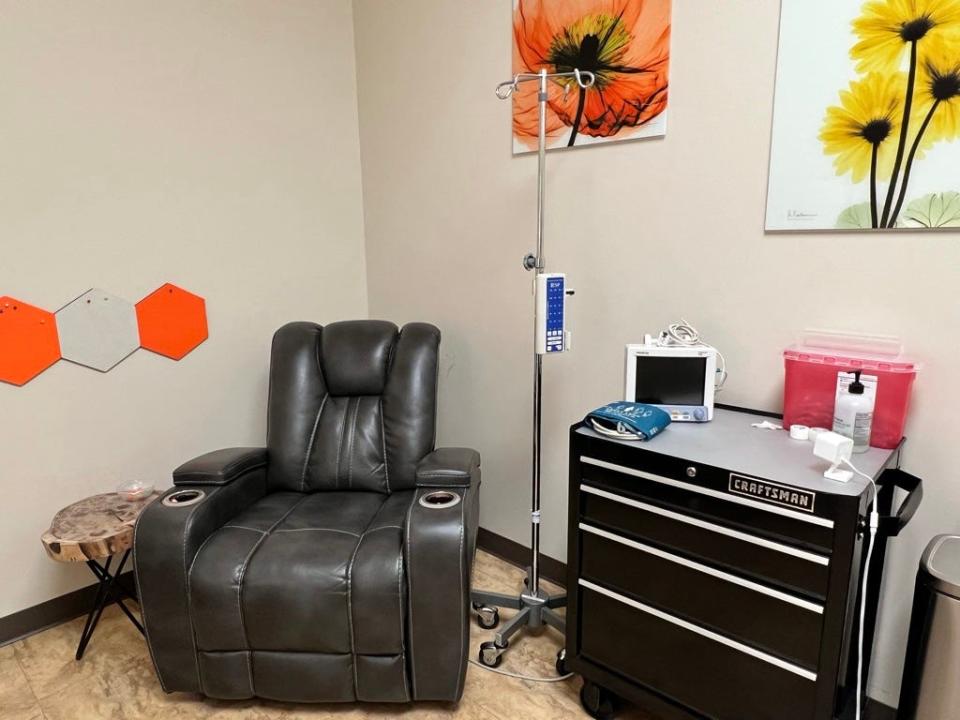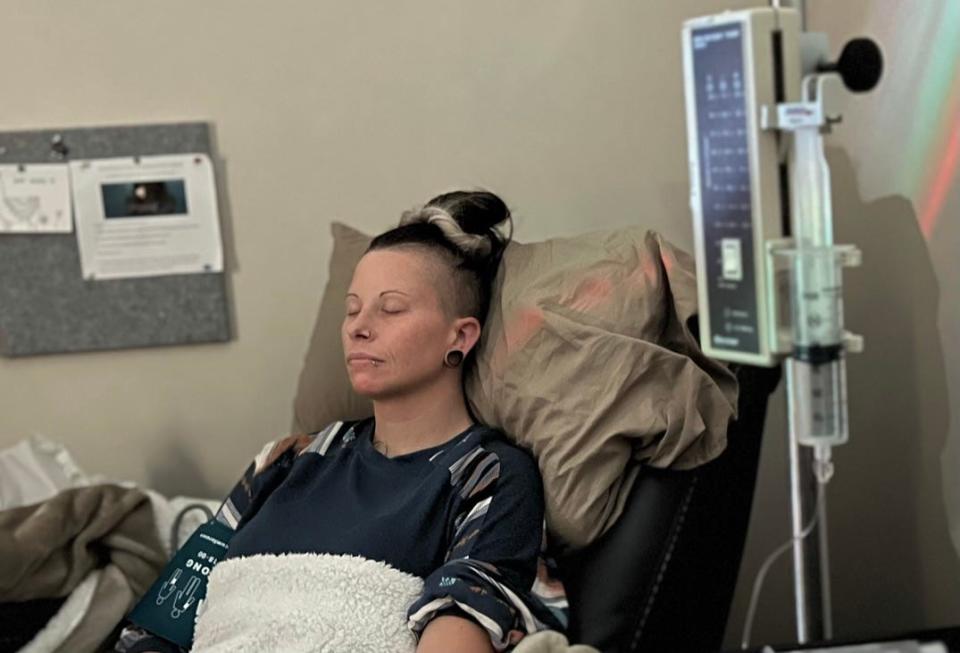Two Milwaukee clinics are treating depression with ketamine, here's what to know

Grace Bucher has been living with major depressive disorder and PTSD since she was a teenager.
Beginning at age 15, she'd been prescribed various treatments and medications, some more effective than others. The worst of her symptoms had improved by last summer, but she still felt like she wasn't living the "healthiest version" of her life.
"I'd been on every antidepressant, every anti-anxiety medication. I've been in-patient three times," she said. "I felt like I'd just kind of run the gamut of what was available for mental health and felt like I was kind of plateauing."
Then, late last summer, Bucher started taking ketamine at a Milwaukee-area clinic.
While most people know ketamine as a hallucinogenic party drug that induces a dissociative state, recent research has shown that the drug can treat depression and other mental health disorders in some patients, especially those whose disorder has been resistant to other medications.
In about the past decade, ketamine clinics treating those with mental health conditions have popped up in Milwaukee and across the country. Some use esketamine nasal spray to treat patients; others use IV ketamine infusions or rapidly dissolving oral tablets. The nasal spray is currently the only form with FDA approval, though some testing has found the other forms effective.
Bucher began ketamine infusion treatments in 2022 at Edelica Health, a Milwaukee clinic that was among the first in the United States to offer infusions for depression and other mental health conditions.
"I stopped having nightmares. I wasn't having panic attacks. The major depressive episodes that I'd gotten used to having at least once a month just kind of stopped," she recalled.
Here's what to know about ketamine treatments and their potential for treating mental health conditions.
What is ketamine?
Ketamine is a dissociative anesthetic with some hallucinogenic effects. The drug distorts users' perception of sight and sound. It can also cause feelings of sedation, calmness and relaxation. It is classified as a Schedule III drug by the Drug Enforcement Administration, meaning that it has potential for abuse that could lead to moderate to low physical dependence or high psychological dependence.
Ketamine can be effective for pain relief because it makes the user feel "disconnected" from their pain.
Ketamine has been an approved medical product as an injectable, short-acting anesthetic for use in hospitals and clinics since the 1970s, according to the United States Drug Enforcement Administration. It's also been approved for use as esketamine nasal spray for depression since 2019.
Ketamine has a history of use as a recreational party drug, used for its psychedelic effects. It has also been used as a "date rape" drug because, at high doses, it can cause people to lose consciousness, become confused and compliant, or forget what happened while under the influence of the drug.
What can ketamine treat?
When it comes to mental health uses, ketamine is only FDA approved to treat depression.
However, Edelica and Perspective Wellness, another Milwaukee-area ketamine clinic, offer ketamine treatment for the following:
Major depressive disorder
Bipolar disorder
Nerve pain
Post-traumatic stress disorder
Suicidal ideation
Anxiety

How does ketamine work to treat depression?
Most antidepressants act on the monoamine system of the brain, targeting serotonin or similar neurotransmitters. Ketamine appears to target the completely separate glutamate system.
Because of this, ketamine stimulates a protein called brain-derived neurotrophic factor. The protein creates more connections between brain cells, which is thought to ease depression and decrease suicidal thoughts. Some research has shown that ketamine treatment is effective in about 70% of treatment-resistant depression cases.
Additionally, because ketamine is different from traditional antidepressants, patients experience its effects in hours, rather than days or weeks.
What are some dangers with ketamine treatments?
Psychiatrist Dr. Smita Das, a Stanford University professor and chair of the American Psychiatric Association's Council on Addiction Psychiatry, warns patients and others in the medical community to be skeptical of non-FDA-approved treatments.
"We have strong, evidence-based ways of treating things like depression that should be considered before ketamine …," Das said. "These include things like therapy, medications, combinations of those."
She said she doesn't want patients to "spend their time, money and energy on treatments that are less proven, like ketamine infusions," when they could benefit from more proven methods.
But, despite her hesitance when it comes to ketamine treatment, Das said she understands why it might appeal to patients, especially those who've been struggling with their mental health for a long time.
Not much research has been done on the long-term effects of ketamine treatment. However, Dr. Joshua Berman, who helps lead the development of Columbia University's ketamine treatment program, told the New York Times that ketamine's impacts "can also be transient," meaning patients may need to keep taking the drug regularly once beginning treatment.
Is ketamine treatment covered by insurance?
Insurance generally covers esketamine nasal spray, because it has been FDA approved, but not other ketamine treatment methods. Those treatments may cost between $400-$800 per treatment on average.
There are nonprofit groups that assist patients in paying for treatment.

Is ketamine treatment safe for me?
Ketamine treatment is not recommended for people with certain health conditions. These include high blood pressure, thyroid issues, people in the manic phase of bipolar disorder and people with schizophrenia, because it can trigger psychotic episodes.
Das also warned against use by people with a history of substance use disorders. As an addiction psychiatrist, she said she's seen an increase in patients who've started ketamine treatments, but when they can no longer access or afford to continue them, turn to other substances like alcohol or street ketamine.
This article originally appeared on Milwaukee Journal Sentinel: How does ketamine treatment for depression work at Milwaukee clinics?

